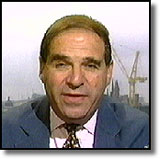
|
French and German Leaders Fail to Resolve Euro crisisWith just days before the European Union summit in Amsterdam, the leaders of France and Germany have failed to reach agreement on the terms for monetary union, and in particular how to bring down unemployment.The German Chancellor Kohl, the French President Chirac and his new Socialist Prime Minister, Lionel Jospin, tried to resolve their differences at a meeting in the French city of Poitiers. But after five hours of talks, the French President, Jacques Chirac said France and Germany had held to largely different positions and no solution had been found. The main stumbling block is Mr Kohl's refusal to shift the emphasis of economic policy in the run-up to a single currency from austerity towards growth and job creation. The new French Prime Minister Lionel Jospin wants a focus on job creation as a condition for signing the stability pact, the key document that's needed to pave the way for the single currency. During the talks, Mr Chirac asked Mr Kohl to show understanding for the new French position on the European Union's "stability pact" limiting budget deficits, given both countries' attachment to achieving Economic and Monetary Union.
But the Chancellor Kohl insisted the stability pact was completed and could not be renegotiated. As for the fight against unemployment, he said it was Germany's number one domestic problem, but Germany would not accept the transfer of more funds or powers to Brussels. The French Prime Minister held firm to his demand for firm commitments from the European Union heads of government to step up the fight against unemployment and coordinate government economic policies more closely. Mr Jospin said the new French government favoured launching the single currency at the planned time, but the needs of the people of Europe for jobs and social welfare could not be met by monetary means alone or just by balancing the government budgets.
Germany is anxious to maintain the momentum towards launching a single currency on 1 January 1999. Doubts about the feasibility of the target were raised earlier this week after France expressed reservations over the so-called "stability pact", which is set to be ratified at the Amsterdam Summit. The pact imposes tight fiscal controls on participating states; France is worried that this might damage plans to promote growth and create jobs. On Thursday, the European Commission President, Jacques Santer, met with Mr Jospin in Paris. Afterwards, Mr Santer said he thought the pact could be agreed in Amsterdam with French support. However, Mr Jospin remained non-committal after the meeting, saying only: "I think these concerns have been understood. We are making progress." Speaking to the BBC, Sir Leon Brittan, the EU Commissioner, dismissed the suggestion that the single currency would have to be delayed. He said there was no reason for a conflict between an increased emphasis on unemployment and the Euro being launched on schedule. |
Diana, Princess of Wales, 1961-1997
Conference 97
Devolution
The Archive
News |
Issues |
Background |
Parties |
Analysis |
TV/Radio/Web
Interactive |
Forum |
Live |
About This Site
News |
Issues |
Background |
Parties |
Analysis |
TV/Radio/Web
Interactive |
Forum |
Live |
About This Site
© BBC 1997 |
politics97@bbc.co.uk |


